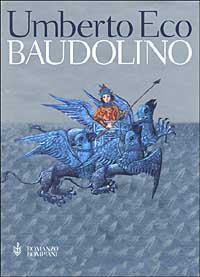Baudolino

First edition (Italian)
|
|
| Author | Umberto Eco |
|---|---|
| Translator | William Weaver |
| Country | Italy |
| Language | Italian |
| Genre | Historical novel, speculative fiction |
| Publisher |
Bompiani (Italy) Secker & Warburg (UK) Harcourt (USA) |
|
Publication date
|
2000 |
|
Published in English
|
15 October 2002 |
| Media type | Print (Hardcover, paperback) |
| Pages | 528 pp (U.S. hardback edition) |
| ISBN | (U.S. hardback edition) |
| OCLC | 49002024 |
| 853/.914 21 | |
| LC Class | PQ4865.C6 B3813 2002 |
Baudolino is a 2000 novel by Umberto Eco about the adventures of a young man named Baudolino in the known and mythical Christian world of the 12th century.
Baudolino was translated into English in 2001 by William Weaver. The novel presented a number of particular difficulties in translation, not the least of which is that there are ten or so pages written in a made-up language that is a mixture of Latin, medieval Italian and other languages (intended to reconstruct how a barely-literate Italian peasant boy of the 12th Century would have tried to write in the vernacular).
In the year of 1204, Baudolino of Alessandria enters Constantinople, unaware of the Fourth Crusade that has thrown the city into chaos. In the confusion, he meets Niketas Choniates and saves his life. Niketas is amazed by his language genius, speaking many languages he has never heard, and on the question: if he is not part of the crusade, who is he? Baudolino begins to recount his life story to Niketas.
His story begins in 1155, when Baudolino - a highly talented Italian peasant boy - is sold to and adopted by the emperor Frederick I. At court and on the battlefield, he is educated in reading and writing Latin and learns about the power struggles and battles of northern Italy at the time. He is sent to Paris to become a scholar.
In Paris, he gains friends (such as the Archpoet, Abdul, Robert de Boron and Kyot, the purported source of Wolfram von Eschenbach's Parzival) and learns about the legendary kingdom of Prester John. From this event onward, Baudolino dreams of reaching this fabled land.
The earlier parts of the story follow the general historical and geographical outlines of 12th Century Europe, with special emphasis on the Emperor Frederick's futile efforts to subdue the increasingly independent and assertive city states of Northern Italy. Baudolino, being both a beloved adopted son to the Emperor and a loyal native of the newly founded and highly rebellious town of Alessandria plays a key role in effecting reconciliation between the Emperor and the Alessandria townspeople, who are led by Baudolino's biological father; a way is found for the Emperor to recognize Alessandria's independence without losing face. (It is no accident that Alessandria is Umberto Eco's own hometown).
...
Wikipedia
